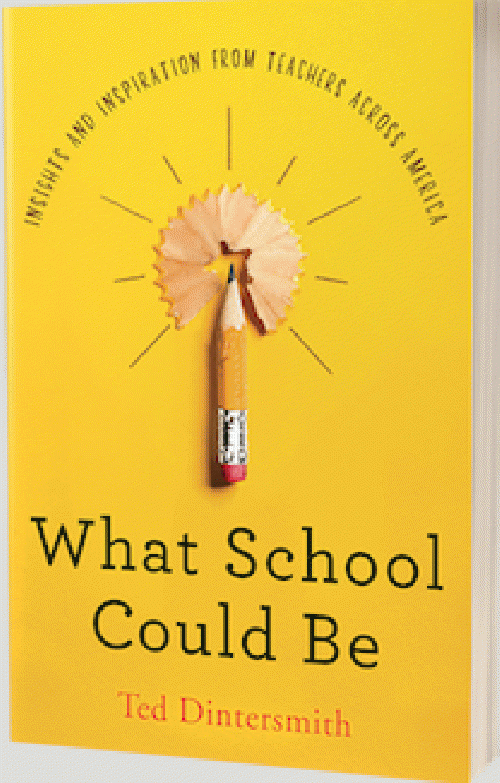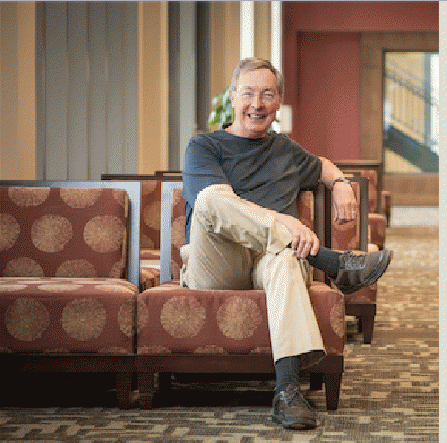My guest today is Ted Dintersmith, venture capitalist, education philanthropist and author of What School Could Be: Insights and Inspiration from Teachers Across America.

Cover art for 'What School Could Be'
(Image by teddintersmith.com/what-school-could-be/) Details DMCA
Joan Brunwasser: Welcome to OpEdNews, Ted. I had the pleasure of hearing you speak at a recent *lecture. You could also be described as a revolutionary, at least where education is concerned. What turned you into an activist?
Ted Dintersmith: It was the confluence (an SAT word!) of two perspectives. First, machine intelligence is advancing at an accelerating pace. Within a decade or so, there won't be any routine jobs left in the economy. And it poses enormous complications to responsible, informed citizenship. Second, in most of our schools, a student will make the Honor Roll by excelling at memorizing content, replicating low-level procedures, and following instructions -- the exact sweet spot of machine intelligence. In a very real way, our education system is preparing our children to fail in a world of innovation. And it doesn't have to be this way. Once I concluded that we can, and absolutely need to, reimagine school to empower our kids to thrive in their futures, I was compelled to dedicate my life and much of my money to this cause.
This shift happened gradually, then suddenly. Many of these issues had perplexed me during my career in venture capital. We were backing start-ups that were going to restructure entire industries and, in the process, eliminate lots of jobs. And I saw far too many academic superstars flounder when faced with the ambiguity and real risk of failure in the innovation economy. But it really crystallized for me about a decade ago when my kids were in middle school. I got a note from the school about a brown bag lunch for parents on a brand new initiative to teach students important life skills.
That got my attention, and led to my beginning to reflect on what school is all about. Why a new program to prepare kids for life? Isn't that the core mission of school?? As I dove into this fundamental issue, I reached the conclusion that, for the most part in the U.S. today, the purpose of school is to prepare kids for standardized tests and college applications -- not for life. Worse, when you really examine what goes on with our kids in school, it actually impairs their life prospects in the world of innovation -- by diminishing their curiosity, audacity, and creativity. Absent profound change, millions of kids -- rich, poor, and in between -- are at risk. So much so that the health of our democracy is on the line. That strikes me as a cause worth fighting for.
JB: Agreed. You feel so strongly about this that you dedicated an entire academic year to looking more closely at schools across the country and then analyzing what you observed. Tell us about that, please.
TD: During the entire 2015-2016 school year, I traveled pretty much non-stop, going to all fifty states, visiting 200 schools, and convening 1,000 meetings. To say it was an intense immersion is a bit of an understatement. But so many non-educators weigh in on education without doing much homework -- and I didn't want to make that mistake. For most of the trip, I had no thought of writing a book about the experience. But by the end, I had seen so many remarkable classroom innovations, and met so many inspiring teachers, that I just had to convey what I observed. The result is What School Could Be: Insights and Inspiration from Teachers Across America. Demand has been so high that the initial print run sold out in just a few weeks and we're now in the second printing. It's an uplifting look at what's going right in our schools, and what conditions foster the innovations leading to these compelling learning experiences. We now have a great discussion guide to accompany the book, and are getting lots of interest from schools and districts to use the book as a summer reading resource.
JB: That's exciting! How did you decide where to go, who to speak with and what to look for? And did that change as the year progressed?
TD: The honest truth is that I didn't give myself much lead time before deciding to do this trip. In late July, 2015, I was on the phone with Greg Tehven, who runs a venture incubator in Fargo, North Dakota. He had some questions for me about venture capital, than asked me what I'm spending time on. As I was describing my interest in education, he stopped me mid-sentence and said, "Hey, can you be here in six days and give a talk at TEDx Fargo? Someone just canceled and I think people here would be interested in what you have to say." So, I canceled a trip to New York, pulled together my talk, and flew to Fargo. On the way, I thought, "Gee, it will be fun to go someplace and talk about education," which led me to decide to go to all fifty states -- which I announced in that TEDx Talk .
After committing to going to all fifty states, I then had to figure out how the heck I'd do it. I talked about the trip to Greg Whiteley, who directed Most Likely to Succeed. He had also directed the documentary on Mitt Romney-- Mitt -- and knew Romney's advance campaign planning team. So I talked to them and they were up for pitching in. The advantage for me was that every day of the nine months was cram-jammed with meetings from breakfast to late evening, with the most interesting set of people and schools.
It really made this immersive trip remarkably productive, and gave me a chance to see and meet so many involved with education. I met with governors, state legislators, commissioners of education, school boards, parents, students, and teachers -- in all sorts of settings. It was so, so interesting. And of all the people I met, I was blown away by our teachers. So many brought such passion and dedication to their profession. And many a time I'd meet with teachers in tears over the anguish they feel in navigating damaging policies.
As the trip evolved, we got more and more adventurous in trying to set up unusual meetings. We pushed the envelope and covered places most people never visit -- tribal villages, lots of rural communities, native American reservations, urban, suburban. The full landscape of American education, including places most people don't even think of as school.
So in writing What School Could Be, I had so many great experiences to draw on. The challenge was distilling them down to a manageable number and presenting them in a compelling way.
JB: Clearly, you're an impulsive guy. All this from one invitation! How did you know what you would find in the various places? Especially since you didn't have a long time to investigate ahead of your trip. I guess what I'm asking is, how does one seek innovation? How did you know who were the right people to talk to, to connect with? It's the nitty gritty here that makes all the difference: the innovative teacher, or school, or project, or just same old, same old. Can you flesh this out a bit, please?
(Note: You can view every article as one long page if you sign up as an Advocate Member, or higher).






